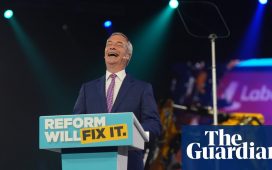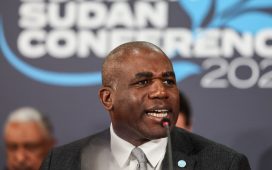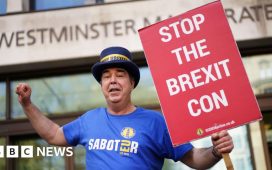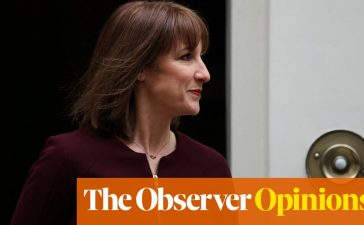No 10 says it will consider Waspi women report, but does not give commitment to paying compensation
Downing Street has not said it will commit to a compensation scheme for Waspi women. At the No 10 lobby briefing this morning, the PM’s spokesperson said the government would need time to consider the report from the Parliamentary and Health Service Ombudsman, but he did not say anything to suggest it was minded to accept the PHSO’s main recommendation (although he did not categorically rule it out either).
This is not a surprise. The PHSO report says: “What DWP has told us during this investigation leads us to strongly doubt it will provide a remedy [ie compensation].”
Asked if the government would pay compensation, the PM’s spokesperson said:
This report has only just been published. The government will now consider the ombudsman’s report and respond to their recommendations formally in due course, and we will of course cooperate with the parliamentary process, as we have done with the ombudsman.
More broadly, we’ve been committed to supporting pensioners in a way that provides them with a sustainable retirement whilst also balancing fairness to them and taxpayers. For example we’ve maintained our commitment to the triple lock.
Key events
-
Peers reject claims they are to blame for Rwanda bill not becoming law before Easter
-
DCMS names expert panel to consider future funding model for BBC, including commercial options
-
Labour says yesterday’s record 514 small boat arrivals outnumber people ‘Tories plan to send to Rwanda in year’
-
Esther McVey claims expenses to rent flat while husband lets out nearby home
-
Number of people living in absolute poverty rises for 2nd year in row, to 600,000, DWP figures show
-
Number of children living in ‘deep poverty’ up by 600,000 since 2010, DWP figures show
-
No 10 says it will consider Waspi women report, but does not give commitment to paying compensation
-
Tory candidate in Greater Manchester mayoral contest defects to Reform UK
-
Waspi campaign leader says it is ‘unbelievable’ DWP is resisting paying compensation
-
Average council tax bills in England to rise by £106, government figures show
-
Fair compensation scheme for Waspi women would cost between £3.5bn and £10.5bn, watchdog says
-
Summary of main findings in PHSO report on Waspi women
-
Waspi women deserve compensation for state pension rise communication failure, watchdog says
-
4.3m children living in poverty, up 100,000 on previous year, DWP figures show
-
Starmer says he talks to Blair ‘a lot’, especially for advice on preparing for government
-
Keir Starmer interviewed by Jeremy Vine on Channel 5
-
Work and pensions secretary Mel Stride suggests mental health culture has ‘gone too far’
Peers reject claims they are to blame for Rwanda bill not becoming law before Easter
Peers have angrily rejected claims that they are to blame for the government not being able to pass its Rwanda bill before Easter, PA Media reports. PA says:
The House of Lords inflicted seven defeats on the government over its safety of Rwanda (asylum and immigration) bill last night, including a bid to restore the power of the courts to intervene in removals to Rwanda.
Peers have said the government initially scheduled for MPs to respond to Lords amendments early next week, which would have allowed time for the “ping pong” process – when the bill shuttles between the Commons and the Lords until agreement is reached – to conclude before the Easter recess.
However, the government has confirmed the government will not debate the bill again until the Commons returns on Monday 15 April, after the Easter recess.
In the Lords today Lord Forsyth of Drumlean, a former Conservative cabinet minister, asked: “Has the minister seen the reports in The Times and Telegraph, and other newspapers, suggesting that this House has delayed the passage of the Rwanda bill unnecessarily, resulting in people being exposed to the dangers of the Channel?
“Will he take this opportunity to point out that this house was well prepared to pass the legislation back for consideration in the House of Commons before Easter and it is no fault of this house that the legislation has been delayed? And that this house has just been doing its job, which is asking the Commons to think again, and is not responsible for delaying the legislation?”
Vocal support was heard from across the house as peers shouted “hear hear”.
Home Office minister Lord Sharpe of Epsom said: “I’m happy to reassure him that I have seen those reports and I can also reassure him that I passed that very message back before those newspapers published those reports.”
When Rishi Sunak announced plans for the Rwanda bill last year, as a response to a supreme court ruling saying Rwanda was not a safe country, he described it as “emergency legislation”.
But at the No 10 lobby briefing this morning the PM’s spokesperson was reluctant to use the same phrase. Instead he described it as legislation “dealing with a migration emergency”.
The term emergency legislation is usually applied to bills rushed through parliament at speed. Ministers know that, after a few rounds of “ping pong”, the Lords will back down and the government could easily have scheduled these debates so as to conclude this process before Easter.
Ministers have refused to explain why they are delaying. But the new timetable means the bill will get royal assent about two weeks before the local elections, and the first flight to Rwanda may leave in the weeks after the local elections, when likely Tory losses mean Rishi Sunak will be in need of as much “good news” as he can get.
DCMS names expert panel to consider future funding model for BBC, including commercial options
A review into how the BBC is funded will look at whether the corporation should have some fully commercial services, PA Media reports. PA says:
The Department for Media, Culture and Sport (DCMS) has announced appointments to the expert panel, which will provide recommendations to the government on if the licence fee is “sustainable”.
The group includes former chairman of ITV Sir Peter Bazalgette, former broadcast journalist and ex-director of communications at Downing Street Amber de Botton, and David Elstein, a former Channel 5 and BSkyB executive and ex-chairman of media site openDemocracy.
Under the BBC Funding Model Review’s terms of reference, they will consider what corporation services could become fully commercial and how much business revenue the broadcaster could generate.
Culture Secretary Lucy Frazer, who will be chairwoman of the panel’s meetings with media minister Julia Lopez, said: “The BBC has a unique role in public life and fulfils an important service in projecting and promoting our values and culture at home and around the world. We want to see it thrive for generations to come. But in an evolving media landscape, with increased pressure on licence fee payers, it’s right that we take a look at whether the current funding model is fit for the future.”
As the terms of reference published today confirm, one of the questions the panel will consider is “whether the BBC should provide more services to audiences on a fully commercial basis, and what those services could be.”
Support for the Conservative party is now as low as it was at the lowest point of Liz Truss’s premiership, according to YouGov polling.
The Tory vote share has now fallen to the same level as lowest point under Liz Truss, while Reform UK reach their highest score to date
Con: 19% (-1 from 12-13 Mar)
Lab: 44% (=)
Reform UK: 15% (+1)
Lib Dem: 9% (=)
Green: 8% (+1)
SNP: 3% (=)https://t.co/ttUyRxRZND pic.twitter.com/nR8mr6fx57— YouGov (@YouGov) March 21, 2024
Labour says yesterday’s record 514 small boat arrivals outnumber people ‘Tories plan to send to Rwanda in year’
Labour has said that the latest small boat arrival figures, showing 514 people crossing the Channel on Wednesday, the highest daily total for 2024, illustrate why the Rwanda policy will not work.
Until yesterday the highest daily total for this year was the 401 – the number who arrived in the UK on small boats on 4 March.
Yvette Cooper, the shadow home secretary, said:
More people crossed the Channel in a single day yesterday than the Tories plan to send to Rwanda in a year – yet their Rwanda scheme will cost the taxpayer a staggering half a billion pounds. It shows Rishi Sunak’s entire approach is just about gimmicks and headlines instead of getting a proper grip.
Over 500 people arrived in small boats yesterday alone, yet ministers have admitted they will only be sending a few hundred people to Rwanda. The Tories have let criminal gangs take hold along the Channel undermining our border security and putting lives at risk.
Labour says the total number of small boat arrivals this year stands at 4,043, compared to 3,683 over the same period in 2023 and 3,229 in 2022. It says that last year the milestone of 4,000 arrivals was not reached until 5 April.
The government has not said exactly many people it will send to Rwanda this year, once the government safety of Rwanda (asylum and immigration) bill passes and once remaining legal hurdles are cleared, but the expectation is that at best the number for 2024 would be in the low hundreds.
Esther McVey claims expenses to rent flat while husband lets out nearby home
Esther McVey, a minister who has criticised Whitehall waste, has claimed tens of thousands of pounds in expenses to rent a London flat despite her husband owning a property a mile away, Eleni Courea reports.
The Department for Work and Pensions has issued its response to the Waspi women report, echoing the relatively negative line taken by No 10 earlier. (See 12.36pm.) A DWP spokesperson said:
We will consider the ombudsman’s report and respond in due course, having co-operated fully throughout this investigation.
The government has always been committed to supporting all pensioners in a sustainable way that gives them a dignified retirement, whilst also being fair to them and taxpayers.
The state pension is the foundation of income in retirement and will remain so as we deliver a further 8.5% rise in April which will increase the state pension for 12 million pensioners by £900.
Number of people living in absolute poverty rises for 2nd year in row, to 600,000, DWP figures show
Another analysis of today’s DWP poverty figures, from the Joseph Rowntree Foundation, has focused on a different finding. The JRF says there are now 600,000 people living in absolute poverty, half of whom are children. This is the second year in a row absolute poverty has risen.
As explained earlier, relative poverty is defined as having a household income below 60% of the median for that year. Absolute poverty is defined as having a household income below 60% of what the median was in a baseline year (normally when a government took office, so 2010-11 for these figures), adjusted for inflation.
Welfare experts tend to view the relative poverty figures as the most important ones, because they are a guide to current levels of inequality.
But government politicians tend to prefer quoting absolute poverty figures because, in a growing economy, they should naturally fall over time. At PMQs Rishi Sunak often says poverty has fallen since 2010, and when he does, he is talking about the absolute poverty measure.
JRF says the rise in absolute poverty is the joint highest annual increase on this measure for 40 years, matched only by the increase between 2010-11 and 2011-12.
Taking into account the previous year’s increase in absolute poverty numbers, there are now 900,000 more people are living in absolute poverty than there were in 2020-21, 400,000 of whom are children. (This is based on the most recent figures, which cover cover 2022-23.)
Peter Matejic, chief analyst at the JRF, said:
The annual poverty figures published today confirm that the government failed to protect the most vulnerable from the cost of living crisis. Absolute poverty, the government’s preferred measure of poverty, has risen for the second year in a row. This is as big as we have seen for 40 years.
Although the number of children in relative poverty has risen year on year by 100,000 (see 10.39am), the overall number of people living in relative poverty has fallen by 100,000. Matejic said that was “largely due to the incomes of middle-income households falling, rather than people on the lowest incomes being better off”. He added: “This is also likely to reverse now that earnings are growing faster than inflation.”
Number of children living in ‘deep poverty’ up by 600,000 since 2010, DWP figures show
The Child Poverty Action Group has issued its anaysis of and reaction to the DWP poverty figures out today. (See 10.39am.) Like Save the Children, CPAG reckons the key statistic is the one showing the number of children living in relative poverty has risen by 100,000. It says this means 4.3 million children (or 30% of all children in the UK) are living in relative poverty, up from 3.6 million 2010-11.
Here are some of the other figures CPAG is highlighting.
-69% of poor children live in working families
-46% of children in families with 3 or more children are in poverty, up from 36% in 2011/12
-Poor families have fallen deeper into poverty: 2.9 million children were in deep poverty (ie, with a household income below 50% of after-housing-costs equivalised median income), 600,000 more than in 2010/11
-36% of all children in poverty were in families with a youngest child aged under five
-47% of children in Asian and British Asian families are in poverty, 51% of children in Black/African/Caribbean and Black British families, and 24% of children in White families
-44% of children in lone parent families were in poverty
-34% of children living in families where someone has a disability were in poverty
Relative poverty is defined as having a household income below 60% of the median for that year. Absolute poverty is defined as having a household income below 60% of what the median was in a baseline year (normally when a government took office, so 2010-11 for these figures), adjusted for inflation. Politicians like quoting the absolute poverty figures because, in a growing economy, they should over time be falling.
Alison Garnham, the CPAG chief executive, said:
In a general election year, nothing should be more important to our political leaders than making things better for the country’s poorest kids.
But child poverty has reached a record high, with 4.3million kids now facing cold homes and empty tummies.
We know that change is possible but we need to see a commitment from all parties to scrap the two child limit and increase child benefits.
No 10 says it will consider Waspi women report, but does not give commitment to paying compensation
Downing Street has not said it will commit to a compensation scheme for Waspi women. At the No 10 lobby briefing this morning, the PM’s spokesperson said the government would need time to consider the report from the Parliamentary and Health Service Ombudsman, but he did not say anything to suggest it was minded to accept the PHSO’s main recommendation (although he did not categorically rule it out either).
This is not a surprise. The PHSO report says: “What DWP has told us during this investigation leads us to strongly doubt it will provide a remedy [ie compensation].”
Asked if the government would pay compensation, the PM’s spokesperson said:
This report has only just been published. The government will now consider the ombudsman’s report and respond to their recommendations formally in due course, and we will of course cooperate with the parliamentary process, as we have done with the ombudsman.
More broadly, we’ve been committed to supporting pensioners in a way that provides them with a sustainable retirement whilst also balancing fairness to them and taxpayers. For example we’ve maintained our commitment to the triple lock.
Tory candidate in Greater Manchester mayoral contest defects to Reform UK

Morgan Ofori
Dan Barker, who was the Conservative candidate for in the Greater Manchester mayoral election in May, has defected to Reform UK.
Barker, from Sale, was only selected as the Tory candidate to challenge Andy Burham in December 2023.
In a post on X Barker claimed Reform UK is the party that represents ordinary people.
Delighted to be joining the new home of conservatism with Reform UK. Reform represent the ordinary people of this country
MPs from the all-party parliamentary group on state pension inequality for women have backed the Waspi campaign group in saying compensation payments should be worth at least £10,000. (See 11.49am.)
Peter Aldous, a Conservative MP and a vice-chair of the group, said:
These millions of women worked, cared for families, and supported communities all their lives. They deserve the dignity of fast compensation.
In line with the report submitted by the state pension inequality for women APPG to the PHSO in 2022, compensation in line with category 6 injustice must be agreed by parliament. The campaign for justice for 1950s women goes on until parliament reaches the right conclusion.
And Rebecca Long-Bailey, a Labour MP and another vice-chair of the APPG, said:
The UK government must right this historic wrong, and go beyond the recommendations of the Parliamentary and Health Service Ombudsman and deliver fair compensation to these women as a matter of urgency.
Long-Bailey was shadow business secretary in 2019 when Labour, under Jeremy Corbyn, proposed a £58bn compensation package for Waspi women during the 2019 election.











